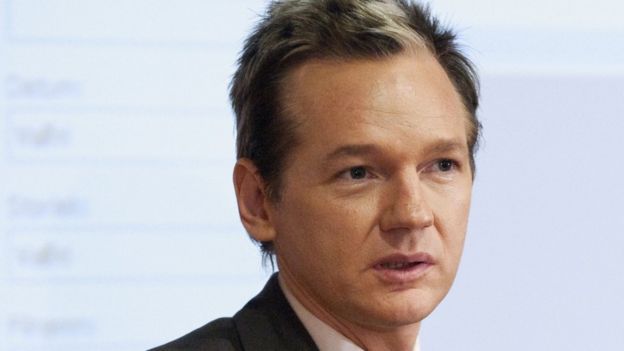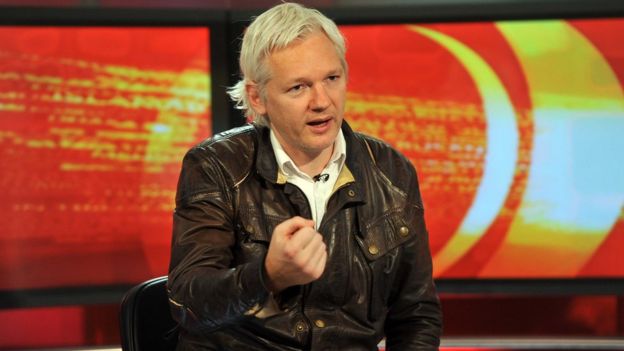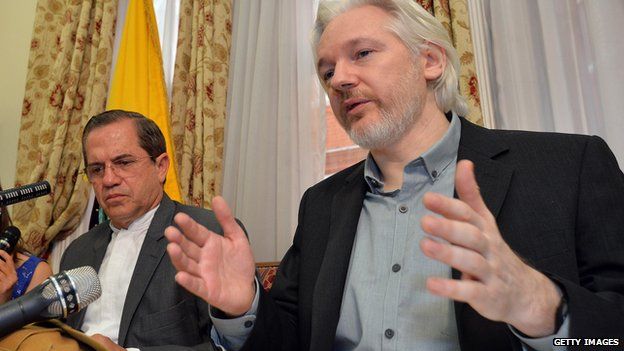- 4 January 2017
- World
-
(인문학) 위키리크스 설립자 줄리안 어산지는 어떤 사람인가?사람되기/인문학 2017. 2. 6. 14:11
출처: http://www.bbc.com/news/world-11047811
Profile: Wikileaks founder Julian Assange
 GETTY IMAGES
GETTY IMAGESJulian Assange has sought asylum at the Ecuadorean embassy in London since 2012 To his supporters, Julian Assange is a valiant campaigner for truth. To his critics, he is a publicity-seeker who has endangered lives by putting a mass of sensitive information into the public domain.
Mr Assange is described by those who have worked with him as intense, driven and highly intelligent - with an exceptional ability to crack computer codes.
He set up Wikileaks, which publishes confidential documents and images, in 2006 - making headlines around the world in April 2010 when it released footage showing US soldiers shooting dead 18 civilians from a helicopter in Iraq.
But, later that year, he was detained in the UK after Sweden issued an international arrest warrant over allegations of sexual assault.
Swedish authorities said they wanted to question him over claims that he raped one woman and sexually molested and coerced another in August of that year, while on a visit to Stockholm to give a lecture. He says both encounters were entirely consensual.
Political asylum
He spent the following months fighting extradition while under house arrest in a small rural town in England. Westminster Magistrates' Court approved the extradition in February 2011 and this was later upheld by the High Court.
On 14 June 2012, the UK Supreme Court dismissed his application to re-open the appeal.
A few days later, Mr Assange sought refuge in the Ecuadorean embassy in London, where he remains after being granted political asylum by the South American country on 16 August 2012.
He fears being extradited from Sweden to the US and put on trial for releasing secret US documents.
 GETTY IMAGES
GETTY IMAGESMr Assange used a speech in London to urge the US to end its "witchhunt" against Wikileaks The UK government has said it will not allow him safe passage out of the country to fly to Ecuador as it is legally obliged to extradite him to Sweden. The Swedish foreign ministry insisted the sole reason they want Mr Assange extradited is so the allegations against him can be properly investigated.
Sweden's prosecutors dropped their investigation into the sexual assault allegations on 13 August 2015 after running out of time to question and bring charges against Mr Assange, but he was later questioned relating to the more serious accusation of rape.
In October 2016, Mr Assange requested to attend the funeral of Gavin MacFadyen, a US journalist and Wikileaks director who died in London on 22 October, aged 76. His request was denied by Swedish prosecutors.
He said he was "heartbroken" by the decision.
Assange, Wikileaks and the US election
On 18 October 2016, Wikileaks reported that Ecuador had shut down Mr Assange's internet access at the embassy in London.
 TWITTER
TWITTEREcuador later acknowledged that it had made the "temporary" move after the Wikileaks founder released material that "could have an impact" on the US presidential election. But Ecuadorian officials denied accusations by the pro-transparency group that the decision was the result of pressure from Washington.
The material published by the whistle-blowing site included transcripts of private speeches made by Hillary Clinton in 2013 and 2014. It also posted thousands of hacked emails, including exchanges with between Mrs Clinton and her staff.
The White House has claimed that the cyber-breach was orchestrated by Russian hackers with the aim of undermining the US democratic process.
That has been disputed by Mr Assange, who in an interview with Fox News on 3 January 2017 repeated his claim that Russia was not behind the leak.
Reluctant spotlight
 REUTERS
REUTERSAfter pleading guilty to "hacking", Mr Assange escaped prison on the condition he did not reoffend Mr Assange has been generally reluctant to talk about his background, but media interest since the emergence of Wikileaks has thrown up some insight into his influences.
He was born in Townsville, in the Australian state of Queensland, in 1971 and led a nomadic childhood while his parents ran a touring theatre.
He became a father at 18, and custody battles soon followed.
The development of the internet gave him a chance to use his early promise at maths, though this, too, led to difficulties.
In 1995 he was accused with a friend of dozens of hacking activities.
Though the group of hackers was skilled enough to track detectives tracking them, Mr Assange was eventually caught and pleaded guilty.
He was fined several thousand Australian dollars - only escaping a prison term on the condition that he did not reoffend.
 AP
APMr Assange was said to be "interested in the concept of ethics" by academic Suelette Dreyfus He then spent three years working with an academic, Suelette Dreyfus, who was researching the emerging, subversive side of the internet, writing a book with her, Underground, that became a bestseller in the computing fraternity.
Ms Dreyfus described Mr Assange as a "very skilled researcher" who was "quite interested in the concept of ethics, concepts of justice, what governments should and shouldn't do".
This was followed by a course in physics and maths at Melbourne University, where he became a prominent member of a mathematics society, inventing an elaborate puzzle that contemporaries said he excelled at.
Keeping sources safe
He began Wikileaks in 2006 with a group of like-minded people from across the web, creating a web-based "dead-letterbox" for would-be leakers.
"[To] keep our sources safe, we have had to spread assets, encrypt everything, and move telecommunications and people around the world to activate protective laws in different national jurisdictions," Mr Assange told the BBC in 2011.
"We've become good at it, and never lost a case, or a source, but we can't expect everyone to go through the extraordinary efforts that we do."

Mr Assange told the BBC that in order to protect sources he would "encrypt everything" He adopted a nomadic lifestyle, running Wikileaks from temporary, shifting locations.
He could go long stretches without eating, and focus on work with very little sleep, according to Raffi Khatchadourian, a reporter for the New Yorker magazine who spent several weeks travelling with him.
"He creates this atmosphere around him where the people who are close to him want to care for him to help keep him going. I would say that probably has something to do with his charisma."
Release of classified documents
Mr Assange came to prominence with the release of the footage of the US helicopter shooting civilians in Iraq.
He promoted and defended the video, as well as the massive releases of classified US military documents on the Afghan and Iraq wars, in July and October 2010.
The Wikileaks website went on to release new tranches of documents, including five million confidential emails from US-based intelligence company Stratfor.
But it also found itself fighting for survival in 2010 when a number of US financial institutions began to block donations.
Bitter legal battle
Coverage of Mr Assange has been dominated by Sweden's efforts to question him over the sexual allegations.
He has said that such efforts are politically motivated and are part of a smear campaign against him and his whistle-blowing website.
He made a submission to the UK's Leveson Inquiry into press standards, saying he had faced "widespread inaccurate and negative media coverage".
Mr Assange has been fighting a bitter legal battle since his arrest in London in December 2010. He spent eight nights in prison before being released and put under house arrest without charge, as the guest of wealthy supporters.
He won the right to petition the UK Supreme Court directly in his fight against extradition, but the court's judges dismissed his challenge.
Mr Assange turned to Ecuador's President Rafael Correa for help, the two men having expressed similar views on freedom in the past. During an interview for Mr Assange's TV show on Russia Today, Mr Correa repeatedly praised Wikileaks and its work.
His stay at the Ecuadorean embassy has been punctuated by occasional press statements and interviews.
Health concerns
 GETTY IMAGES
GETTY IMAGESMr Assange dismissed reports in 2014 that he would be leaving the embassy to seek medical treatment Concerns over his health have also surfaced. As early as October 2012, Ecuador's embassy said it has sought assurances that Mr Assange would not be arrested if he was taken to hospital, saying it is "very concerned" over his condition, indicating he had a lung infection.
But sitting alongside Ecuador's foreign minister at a news conference at the embassy in August 2014, Mr Assange dismissed newspaper reports that he would be leaving the embassy to seek medical treatment.
Investigation stalls
In 2014, the Swedish investigation stalled as prosecutors insisted on questioning Mr Assange in Sweden.
In March they offered to travel to London to interview him. But they then had to drop the inquiry into the sexual assault allegations on 13 August as under Swedish law, charges cannot be laid without interviewing the suspect and they had run out of time to do so.
After the decision, Mr Assange said he was "extremely disappointed" and that the Swedish prosecutor had avoided hearing his side of the story.
The accusations were "time-barred" under Swedish law. Investigators had until 13 August to question Mr Assange about one accusation of sexual molestation and one of unlawful coercion, while the time limit on a further allegation of sexual molestation was to run out later the same month.
 AP
APMr Assange has complained to the UN that he is being unlawfully detained The allegation of rape is not due to expire until 2020, and prosecutors say their investigation will continue.
Mr Assange later complained to the UN that he was being unlawfully detained as he could not leave the embassy without being arrested.
In February 2016, the UN panel ruled in his favour, stating that he had been "arbitrarily detained", and should be allowed to walk free and compensated for his "deprivation of liberty".
Mr Assange hailed it a "significant victory" and called the decision "binding".
The ruling is not legally binding on the UK, however, and the UK Foreign Office responded by saying it "changes nothing". The Metropolitan Police have said he will still be arrested if he leaves the embassy where, for now, he remains.
'사람되기 > 인문학' 카테고리의 다른 글
(인문학) Knights Templar 성전기사단 (0) 2017.02.14 (인문학) Julian Assange (0) 2017.02.06 (인문학) 파키스탄 정치가 무함마드 지아울하크 Muhammad Zia-ul-Haq(1924-1988) (0) 2017.02.06 (인문학) George Orwell <Animal Farm and 1984> (0) 2017.01.25 (인문학) Anglosphere (0) 2017.01.15